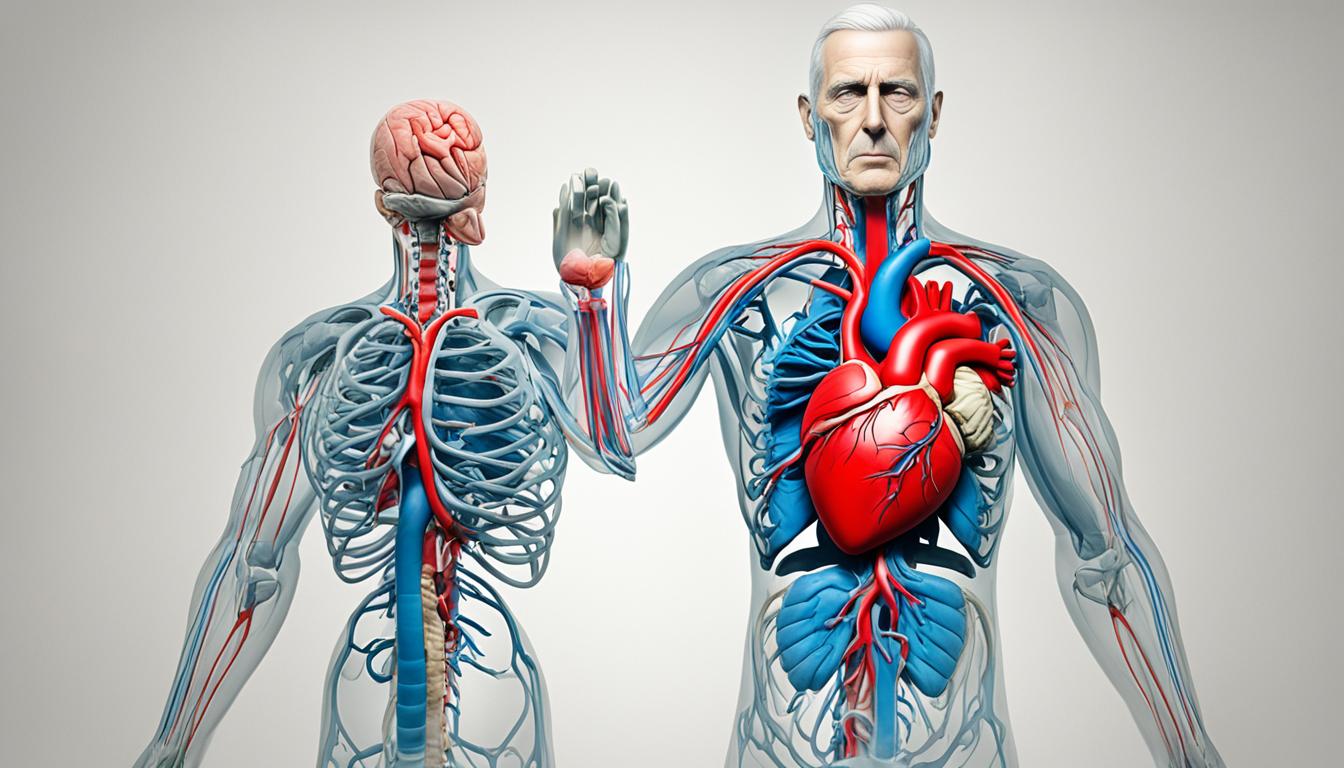Sudden cardiac arrest (SCA) is very serious. It happens when the heart suddenly stops. This leads to a stop in breathing and fainting. About 300,000 people in the US die from SCA each year.
SCA occurs due to a problem with the heart’s electrical system. The heart can’t pump blood well. This affects the brain and other organs. Sadly, it often leads to death. SCA is hard to predict and stop because most people don’t have warning signs.
Treating SCA right away is key to saving lives. Help can come from CPR (cardiopulmonary resuscitation) and a defibrillator. New methods, like stem cell therapy, are showing promise too. This therapy helps repair the heart’s damaged areas. It might change how we treat SCA in the future.
Key Takeaways:
- Sudden cardiac arrest is a life-threatening condition characterized by the sudden cessation of heart function.
- Abnormal electrical activity in the heart is a key factor in the development of sudden cardiac arrest.
- Treatment options for sudden cardiac arrest include CPR and defibrillation.
- Stem cell therapy is an emerging treatment approach that shows promise in the field of cardiac emergencies and heart failure.
- Regenerative medicine, such as stem cell therapy, offers potential advancements in the treatment of sudden cardiac arrest.
Causes and Diagnosis of Sudden Cardiac Arrest
Sudden cardiac arrest is a severe health issue with many causes. The main cause is ventricular fibrillation. This is when the heart’s lower chambers beat rapidly and unevenly. It can also be triggered by a previous heart attack, heart disease, genetic issues, and some drugs.
Finding sudden cardiac arrest early can be hard because it happens quickly without many warning signs. Still, if someone has a history of heart problems, they should pay closer attention. They should talk to their doctor about ways to lower their risk.
It’s very important to educate people about heart health and quick action in emergencies. Using a defibrillator right away can save a person’s life by fixing their heart’s rhythm. This shows why it’s critical to have defibrillators widely available.
Common Causes of Sudden Cardiac Arrest:
- Ventricular fibrillation: An abnormal heart rhythm characterized by rapid and irregular ventricular beating.
- Previous heart attack: The occurrence of a heart attack increases the risk of sudden cardiac arrest.
- Coronary artery disease: Narrowing of the coronary arteries that supply blood to the heart.
- Genetic defects: Inherited conditions that affect the heart’s electrical system.
- Certain medications: Some medications can increase the risk of abnormal heart rhythms.
| Causes | Details |
|---|---|
| Ventricular Fibrillation | An abnormal heart rhythm characterized by rapid and irregular ventricular beating. |
| Previous Heart Attack | A heart attack can cause damage to the heart muscle, increasing the risk of sudden cardiac arrest. |
| Coronary Artery Disease | Narrowing of the coronary arteries that supply blood to the heart, leading to reduced blood flow and increased risk of sudden cardiac arrest. |
| Genetic Defects | Inherited conditions that affect the heart’s electrical system, disrupting normal heart rhythms and potentially leading to sudden cardiac arrest. |
| Certain Medications | Some medications, such as certain antiarrhythmic drugs, can increase the risk of abnormal heart rhythms and sudden cardiac arrest. |
Knowing the reasons behind sudden cardiac arrest and spreading the word about heart health is vital. Early detection, the fast use of defibrillators, and better care for the heart are key to saving lives. We all can help beat this dangerous condition by recognizing its signs and taking quick action.
Advancements in Stem Cell Therapy for Sudden Cardiac Arrest
Stem cell therapy is showing amazing progress as a treatment for sudden cardiac arrest. It’s already clear from research that stem cells can repair heart damage and boost heart function. Scientists use stem cells from places like bone marrow, fat tissue, or blood. They grow them in labs and then put them back into the patient’s blood.
These cells are key for making the heart heal by giving off helpful chemicals. This way of healing the heart is not as hard as surgery. It’s already making life better for people with heart problems.
Stem cell therapy keeps getting better and could change how we treat sudden heart problems. It might make treatments for cardiac arrest, CPR, and using AEDs better. Doctors believe stem cells are the key to finding new ways to help hearts.

